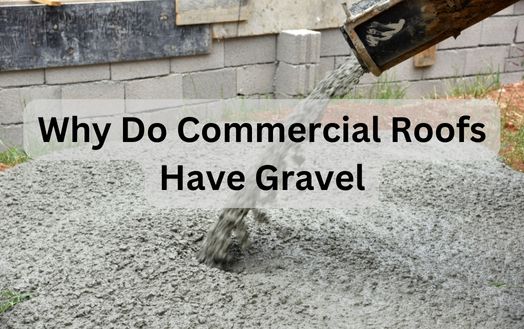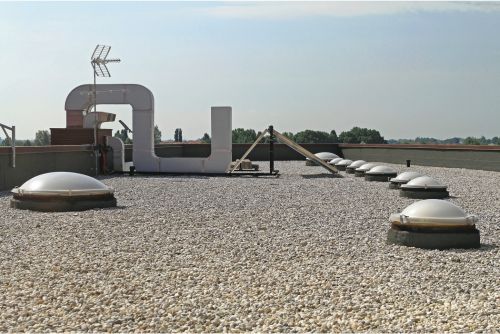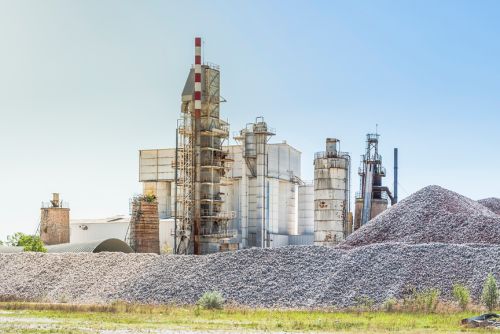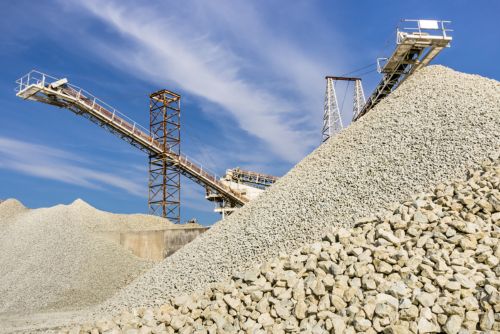
Commercial roofs play a crucial role in protecting the buildings they cover, and there are various types of roofing systems available for commercial buildings. One type of roofing system commonly used in commercial buildings is the flat roofing system. Flat roofs offer a sleek and modern look, making them a popular style for commercial buildings, especially in urban areas. When it comes to flat roofs, material choice is essential to ensure a durable and long-lasting roof that can withstand the weather elements. One material that is often used in commercial roofing systems is gravel. But why do commercial roofs have gravel? In this blog, we will explore the importance of gravel in commercial roofs, its benefits, and its role in enhancing the longevity of the roof.
Commercial buildings often have flat roofing systems, which differ from the pitched roofs commonly seen in residential buildings. A flat roof, as the name suggests, has a low slope or no slope at all, providing a flat surface. This type of roofing system is ideal for commercial buildings as it allows for the efficient use of the available space. Additionally, a flat roof provides a modern and sleek look, which is often desired in commercial settings.
Within the realm of flat roofs, there are different types of commercial roofing materials that are commonly used. Bitumen roofs, for example, are a popular choice due to their durability and ability to withstand the weather elements. Bitumen roofs are made of layers of asphalt and fiberglass or organic materials, creating a strong and weather-resistant membrane.
Another popular material for commercial roofs is thermoplastic polyolefin (TPO) roofing membrane. TPO roofs are known for their weatherproofing aspects, making them an excellent choice for commercial buildings. TPO roofing systems provide exceptional resistance to ultraviolet (UV) rays, ensuring the roof’s durability and longevity.
Polyvinyl chloride (PVC) roofs are also commonly used in commercial buildings. PVC roofs offer UV protection and better grip for foot traffic, making them suitable for commercial settings where people may frequently walk on the roof.
One type of commercial roofing system that stands out is the gravel roof, also known as a ballasted roof. Gravel roofs are a type of flat roofing system that have a layer of gravel on top. This layer of gravel serves several important purposes in the roofing system, contributing to its long-term performance and protection against the weather elements.
-Flat roofing is a popular style for commercial buildings, especially in urban areas.
-Bitumen roofs are a common type of commercial roofing material, known for their durability.
-Thermoplastic polyolefin (TPO) roofing membrane is a popular choice due to its weatherproofing aspects.
-Gravel roofs, or ballasted roofs, are a type of flat roofing system, providing protection against ultraviolet rays and weather elements.
-Polyvinyl chloride (PVC) roofs are suitable for commercial buildings, offering UV protection and a better grip for foot traffic.
The material choice for commercial roofing is crucial for the lifespan of the roof and the structure of the rest of the property. Different materials offer varying levels of protection against natural threats, drainage slope, and water evaporation. Understanding the benefits of a tar and gravel roofing system helps in making an informed material choice for commercial roofs. The type of roofing system determines the maintenance requirements and the ability to withstand significant damage and lesser event for commercial roof repair NJ. The climate of the location influences the material choice, considering the impact of heavy rains, UV radiation, and natural threats.

A layer of gravel on commercial roofs serves several important functions, making it a popular choice for many building owners and architects. Gravel roofs, also known as ballasted roofs, provide protection against the weather elements and enhance the longevity of the roof.
One of the primary reasons gravel is used on commercial roofs is its ability to withstand the weather elements. The weatherproofing aspects of the gravel layer ensure the roof’s durability and resilience, especially in areas with strong sun exposure and heavy rains. The layer of gravel provides a protective shield, reducing the impact of UV radiation and weather-related damage.
Gravel roofs effectively protect the underlying layers of roofing materials from the harsh effects of ultraviolet rays. UV rays can cause the roof surface to deteriorate over time, leading to leaks and other roofing issues. The mix of asphalt and gravel creates a strong, weather-resistant membrane that enhances the roof’s ability to withstand significant damage caused by natural threats.
In addition to providing protection against the weather elements, gravel roofs also contribute to the enhanced longevity of commercial roofs. The layers of gravel act as a protective barrier, extending the life of the roof and maintaining the structure of the building.
The gravel layer helps to distribute the weight of the roof evenly, reducing the stress on the underlying layers of roofing materials. This, in turn, helps to prevent premature deterioration of the roof surface. By acting as a buffer, the gravel layer absorbs the impact of heavy rains, protecting the roof structure from potential damage.
Proper maintenance of gravel roofs is essential to ensure their longevity and ongoing protection against natural threats and weather elements. Regular inspections and cleaning of the gravel layer can help to identify and address any issues before they escalate into significant problems.

Gravel roofs, like any roofing system, have their advantages and disadvantages. Understanding the pros and cons can help building owners and architects make informed decisions when it comes to choosing the right roofing system for their commercial buildings.
-Gravel roofs provide effective protection against ultraviolet rays, weather elements, and natural threats.
-The ballasted roofing system enhances the longevity of commercial roofs, ensuring long-term performance.
-Gravel roofing systems offer a cost-effective and durable solution, suitable for various commercial building structures and being offered by multiple commercial roofing contractor NJ.
-Properly installed gravel roofs provide a strong, weather-resistant membrane, reducing the impact of UV radiation and heavy rains.
-The layers of gravel act as a protective shield, preventing significant damage and ensuring the roof’s durability.
The weight of gravel in ballasted roofing systems may pose structural challenges and require additional support. Maintenance of gravel roofs involves addressing weatherproofing aspects, drainage slope, and potential water evaporation. Gravel roofing systems, while durable, may have specific maintenance requirements due to the layer of gravel. The climate of the location influences the effectiveness of gravel roofs, considering heavy rains, significant damage, and natural threats. Understanding the drawbacks of gravel roofing systems is essential for evaluating their suitability for commercial buildings and must be consulted to your trusted commercial roofing company NJ.

When choosing a roofing system for a commercial building, it’s important to consider the different options available. Two popular alternatives to gravel roofs are modified bitumen built-up roofing and ballast tar & gravel roofing. By comparing gravel roofs with these alternatives, building owners and architects can make the best choice for their specific needs.
-Gravel roofs offer better grip for foot traffic than modified bitumen roofing systems.
-The weight of gravel in gravel roofs helps hold the underlying layer of roofing materials in place.
-Gravel roofs provide UV protection, extending the life of the roof.
-The underlying layers of roofing in gravel roofs protect the structure of the building from ultraviolet rays.
-Gravel roofing systems are weatherproof, safeguarding the roof surface from natural threats.
-Gravel roofs use a mix of asphalt and mineral granules, unlike ballast tar & gravel roofing systems.
-Gravel roofs have a top coat of asphalt, providing better protection against UV radiation.
-The drainage slope of gravel roofs allows for water evaporation, enhancing the roof maintenance aspect.
-Gravel roofing system has a flood coat, improving the structure of the rest of the property.
-Gravel roofs with layers of gravel act as ballasted roof systems, with benefits of a tar, ballast roofing.
As with any roofing system, proper maintenance is crucial to ensure the longevity and performance of gravel commercial roofs. Regular inspection, cleaning, and addressing repair and replacement needs are essential to keep the roof in optimal condition.
Regular inspections of gravel commercial roofs help ensure the structure of the building is protected. Cleaning the gravel roofs prevents the gravel layer from accumulating debris, which can affect the roof’s maintenance. The slight pitch in gravel commercial roofs supports water drainage, reducing the risks of heavy rains and commercial leak repair NJ. Inspecting the layers of gravel roofs avoids damage caused by the climate of the location such as heavy rains, significant damage, and natural threats. Addressing the weatherproofing aspects of the gravel roofing system supports the lifespan of your roof.
The sort of aggregate material used in gravel roofs determines the climate of the location. Gravel commercial roofs may need repair or replacement due to natural threats like heavy rains, significant damage, and natural threats. The type of roofing system and the layers of gravel impact the benefits of a tar, ballast roofing. The main types of burs used in gravel roofs impact the drainage slope and the life of the roof. Different styles of larger gravel must be repaired and replaced to maintain the structure of the rest of the property.

As gravel commercial roofs are a popular choice, there are often common queries that building owners and architects have about them. By addressing these queries, we can gain a better understanding of why gravel is chosen over other materials in commercial roofing.
Gravel is chosen in commercial roofing due to its popular style of flat roof, which enhances the aesthetics of the building. The significant damage caused by natural threats in commercial buildings necessitates the benefits of a tar, ballast roofing. The layers of gravel in commercial roofs are designed to withstand heavy rains, strong sun exposure, and natural threats. The benefits of a tar, ballast roofing system are reflected in the natural weatherproofing aspects of the gravel roofing system. The lifespan of your roof can be extended with gravel commercial roofs, addressing the underlying layer of roofing materials.
In conclusion, the use of gravel on commercial roofs serves multiple purposes. It provides protection against weather elements, such as UV rays and extreme temperatures, while also enhancing the longevity of the roof itself. Gravel roofs have their advantages, including their affordability, durability, and fire resistance. However, there are also some disadvantages to consider, such as the additional weight it adds to the roof and the potential for clogged drains. When compared to other commercial roofing systems, gravel roofs stand out for their cost-effectiveness and ease of installation. To maintain a gravel commercial roof, regular inspections, cleanings, and timely repairs are necessary. Overall, understanding why do commercial roofs have gravel helps you make informed decisions about your roofing needs and refrain any commercial roof replacement NJ.